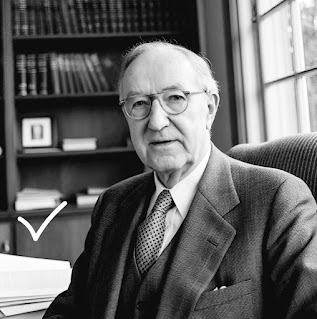Theory of Social Action
Talcott Parsons’ theory is intricately tied to his
conceptualization of society and its functioning. He is renowned in the field
of sociology for constructing a detailed and sophisticated theoretical
framework that analyzes the nuances of social action processes.
According to Parsons, social action is a complex and
systematic process that takes place within what he terms the
"actor-situation system." This sequence is fundamentally significant
to the motivations of the individual actor, or in the context of collective
activities, the participating members. Social action is driven by the pursuit
of satisfaction or the avoidance of displeasure, shaped by the actor’s
psychological and social structures. While rooted in mechanisms that provide an
initial impetus, these actions transcend mere biological connections and are
deeply intertwined with human relationships, social contexts, and cultural
norms. https://amzn.to/3ESwLwJ
The Systems of Social Action
Parsons identifies three primary systems—each pivotal in
shaping and guiding social action:
- Personality
System This system pertains to the intrinsic needs and desires that
compel individuals to engage in specific actions. As individuals strive to
fulfill their needs, they encounter circumstances imbued with symbolic and
representational significance. These situational elements acquire unique
meanings for the individual (or ego) and become integral to organizing
their expectations and behavior. In this way, the personality system
governs the motivational forces behind social interactions.
- Cultural
System This framework focuses on shared meanings and interpretations
of symbols, signs, and ideas as social action progresses. Over time, these
symbols evolve into a cohesive system that facilitates patterned
interactions among actors operating within a particular cultural milieu.
The cultural system represents the collective ideals, values, and norms
that unify social actors and shape the flow of their interactions.
- Social
System The social system encompasses the interplay of multiple actors
within a shared context, including its physical and environmental aspects.
It motivates participants to strive for optimal fulfillment while defining
their relationships to one another. These relationships are structured and
mediated by culturally defined symbols and frameworks that ensure
coherence and order within the system.https://amzn.to/3ESwLwJ
Functional Challenges in Social Systems
Parsons outlines four fundamental challenges—or
"functional imperatives"—that every social system must address to
sustain its equilibrium and functionality:
- Pattern
Maintenance This involves upholding and reinforcing the core values
and principles of the social system while resolving conflicts or tensions
that arise from continued adherence to these norms.
- Integration
Integration ensures the harmonious coordination of system members by
allocating rights, obligations, and resources. This fosters stability and
equilibrium within the social framework.
- Goal
Attainment This imperative emphasizes the necessity of mobilizing
actors and resources in an organized manner to achieve clearly defined
objectives.
- Adaptation
Adaptation pertains to the acquisition or development of generalized
resources and capabilities that can be applied to meet specific goals or
respond to external challenges.
By addressing these challenges, social systems can achieve
differentiation, allowing them to specialize and enhance their functional
capabilities.
Empirical Verification in Parsons’ Theories.
Parsons strongly advocates for the validation of
sociological theories through empirical research. He warns that without such
verification, theories risk becoming speculative or losing their scientific
integrity. He emphasizes that data alone is insufficient; it must be carefully
analyzed, contextualized, and synthesized with theoretical insights. In his
view, observation and theoretical frameworks share an interdependent
relationship, and robust theories must endure empirical scrutiny.
However, critics point out that Parsons himself does not
consistently provide empirical evidence to substantiate his theoretical
propositions.
Rationality and Utilitarian Perspectives
Parsons examines the interplay between rationalist and
utilitarian viewpoints. Rationality, as explored in this context, involves the
alignment of goals, strategies, and situational conditions. For instance,
Pareto identifies rational action as one in which the means employed enable an
actor to anticipate and achieve desired outcomes. This aligns with the
positivist utilitarian tradition, which emphasizes structural elements and
intellectual systems. However, utilitarianism often neglects to examine the intrinsic
nature of the goals it seeks to explain.
Parsons also critiques positivist theoretical frameworks,
which incorporate norms of rationality in relation to heredity and
environmental influences. These frameworks rely on metaphysical assumptions
that extend beyond empirical science.
Stages of Theoretical Reconstruction
Parsons identifies four major stages in the reconstruction
of theoretical perspectives on social action:
- Marshal’s
Utilitarian Tradition Alfred Marshal emphasized the principles of
utility, marginal utility, and substitution, connecting these concepts to
rational decision-making and empirical insights from economic life. His
contributions linked rational choice to social and economic evolution.
- Pareto’s
Voluntaristic Theory of Action Vilfredo Pareto introduced a
distinction between logical actions (guided by rational means to achieve
specific ends) and non-logical actions (those failing to meet rational
criteria). His theories incorporated technological, economic, and
political aspects while maintaining a positivist methodological approach.
- Durkheim’s
Positivist Approach Émile Durkheim rejected utilitarian frameworks,
focusing instead on social constraints and hereditary influences. He
emphasized the distinct nature of social facts, which he viewed as
external and coercive forces shaping individual behavior.
- Weber’s
Value-Oriented Analysis Max Weber explored the intersection of values,
attitudes, and metaphysical ideas, analyzing their impact on social
action. He challenged Marxist interpretations while linking religious and
economic systems to broader social phenomena.
Parsons’ Conclusions
From his studies, Parsons draws the following conclusions:
- Theorists,
despite varying methodologies, converge on the development of a unified
and generalized social theory.
- Social
theory evolves through critical re-evaluation and refinement.
- Robust
theories align closely with empirical realities.
- The
voluntaristic theory of action provides an accurate framework for
interpreting social phenomena.
- Empirical
validation remains a cornerstone of scientific credibility in sociology.
Parsons’ Legacy and Critique
Parsons introduces groundbreaking concepts like the
"Action Frame of Reference" and "Analytical Realism,"
offering tools to understand social action through normative and conditional
lenses. However, his work has been critiqued for gaps in empirical support and
practical application, leaving some questions unresolved.https://amzn.to/3ESwLwJ
 Reviewed by Creative Studies
on
April 04, 2025
Rating:
Reviewed by Creative Studies
on
April 04, 2025
Rating:








No comments: